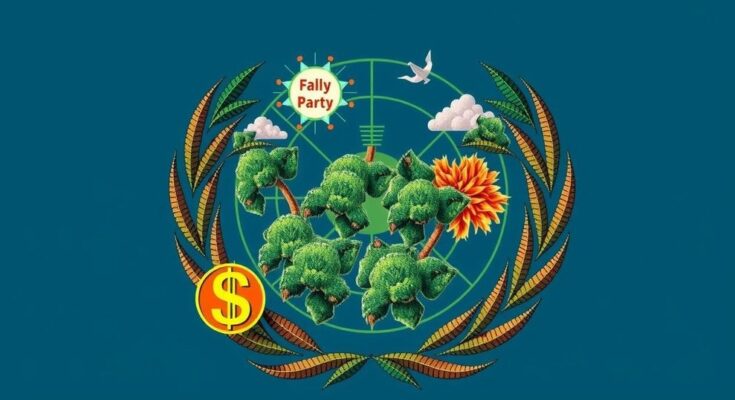Negotiators from rich and poor nations at the UN climate talks in Baku are struggling to finalize a financial deal for developing countries grappling with climate change. Frustration boils over as many reject a rough draft proposing inadequate support, leading to walkouts by delegations. Despite calls for USD 1.3 trillion in assistance, current offers fall far short, fueling tension as the deadline looms.
At the United Nations climate talks in Baku, Azerbaijan, rich and poor nations gathered on Saturday amidst growing tension and urgency to finalize a deal on financial support for developing countries addressing climate change. Developing nations, particularly from Africa and the Alliance of Small Island States, were frustrated with a rough draft proposal deemed unacceptable, triggering a walkout by some delegations. The latest draft proposed annual financial commitments of USD 250 billion by 2035—substantially below the estimated USD 1.3 trillion necessary for adequate climate adaptation and mitigation measures.
As negotiations progressed, accusations emerged that wealthy countries were trying to secure a limited financial aid package through a war of attrition, pressuring delegations from developing nations. With many having tight schedules to return home, there was increasing desperation felt among negotiators. The need for substantial financial commitments from wealthier nations remains paramount, with developing nations seeking funds to cope with climate-related disasters, and transitions to sustainable energy systems.
Despite proposals for increased funding, such as a mention of USD 300 billion, representatives from developing countries criticized the figures as inadequate. Many voiced concerns about the implications of accepting any deal not rooted in the realities of climate financing. Additionally, fears arose over potential backsliding on established commitments to reduce fossil fuel usage.
The ongoing frustration underscored the geopolitical tensions present, as powerful states were blamed for obstructing meaningful progress. It remains uncertain whether an effective financial agreement can be attained at the conclusion of the sessions in Baku. Developing nations emphasized the necessity of swiftly finalizing an equitable deal to ensure meaningful progress in combatting climate change.
The ongoing UN climate talks, pivotal for global cooperation on climate action, serve as a forum where representatives from both developed and developing nations negotiate terms for financial assistance aimed at combating climate change. The 2015 Paris Agreement laid the groundwork, obligating wealthier countries to assist their less affluent counterparts in managing the impacts of climate change, such as extreme weather, food insecurity, and transitioning to renewable energy sources. This year’s discussions in Baku focus on aligning financial pledges with the pressing needs of developing nations, which many believe are inadequately addressed by current commitments.
In summary, the UN climate talks in Baku highlight significant tension regarding the financial commitments necessary for developing nations to effectively combat climate change. A lack of consensus on adequate funding persists amidst frustrations voiced by vulnerable nations. As the deadline approaches, there is a palpable urgency to reach a compelling finance agreement that genuinely reflects the scale of the climate challenges ahead.
Original Source: www.theweek.in




